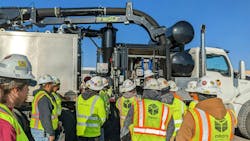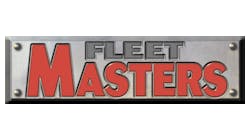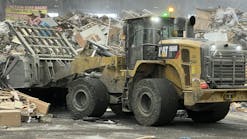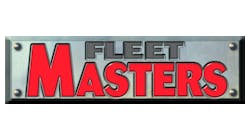Mears Broadband, a fiber optic contractor with work in Texas, Las Vegas, Phoenix, and Colorado Springs, had a huge problem. The company’s equipment department recorded a nine-figure loss in 2022.
There were other issues, too.
“Guys without CDLs were driving larger pickups and pulling trailers,” says Gil Gilbert, CEM, who was Mears Broadband’s fleet manager until recently joining ASN Constructors. “There was equipment that had telematics, but maybe 30% of the units didn’t work and didn’t report. They didn’t make all their subs and visiting mechanics wear PPE.”
There were safety problems, as well. Driver cameras, facing both ways, were put in on-road stock, and a safety moment was required at the beginning of every meeting. Everything was recorded to establish trends for training and awareness.
“They had a terrible problem with collisions,” Gilbert says. “A lot of people had the mentality, ‘It’s a company truck, it doesn’t matter. It’s disposable.’ That is one of the key things; you have to break that culture. It was between that and a terrible culture with wearing PPE. Even in a yard or shop, you need to wear your PPE.”
The “disposable” attitude needed correction and a reminder that there’s an inherent cost to that way of thinking.
“Anytime you try to control costs and go to certain groups, operations, safety, they think that you’re playing in their sandbox, and they don’t want you there,” Gilbert says. “They just don’t understand there’s a cost consequence to that fleet. Next to labor, it’s the most expensive part of any job, and if it’s not handled right, it can bankrupt you.
“Operations feels like they paid for it, it’s theirs, but they don’t realize a corporation or company has invested in that equipment and they expect a return on that investment,” Gilbert says. “Because operations uses it, they need to pay for it on an ongoing basis.”
How to overcome resistance to change
“You always have resistance from the field,” Gilbert says. “I had a boss once, he wasn’t one to give out criticism or much of anything. So, I asked him, ‘How am I doing? And he said everybody hates your guts, you’re doing great!’”
Many at Mears embraced the changes Gilbert implemented, but there were instances of resistance.
“One of the biggest arguments I had was with a VP on the operations side who felt like he shouldn’t be charged an hourly rate for that equipment,” Gilbert says. “[He told me] ‘I already paid for it. Why would I have to do it again?’ They just don’t understand. It’s getting over those thoughts and ideas they have.
“To sit and argue with somebody is like wrestling a pig,” Gilbert says. “The dirtier it gets, the more they like it. What I do is try to coach them, and also make them think [the change is] their idea. And when you start breaking it down to them, they understand.”
Gilbert showed detailed examples of costs to make the financial light bulb go on for others.
“I showed pieces of equipment and how much money the company was spending maintaining and controlling it, all this stuff. Suddenly there was interest because I built a rate builder,” Gilbert says.
“It was a spreadsheet where you can put in the numbers, and it would kick out what the hourly rate should be. And one guy had a ball with it. He spent a whole week checking and setting rates. When I got ready to put my rates in, just to make him feel good about it, I said ‘Hey, review these, let me know what you think.’ He compared it all and loved it. He said, ‘That’s what I thought too!’”
The changes Gilbert implemented at Broadband took eight months, which seems remarkable for forensic accounting, new policies, and culture change. But that’s why he’s a Fleet Master.
Upon winning the 2024 Fleet Masters Award for small fleets (estimated replacement value under $1 million), Gilbert has become the first fleet manager to win the Fleet Masters Award with two different companies.
Although he has left Mears Broadband to work for ASN Constructors in Fargo, North Dakota, he says he speaks to colleagues at Mears almost daily.
“They have a very bright future.”








